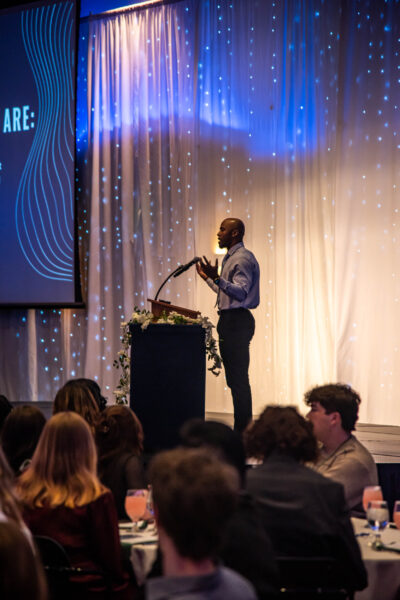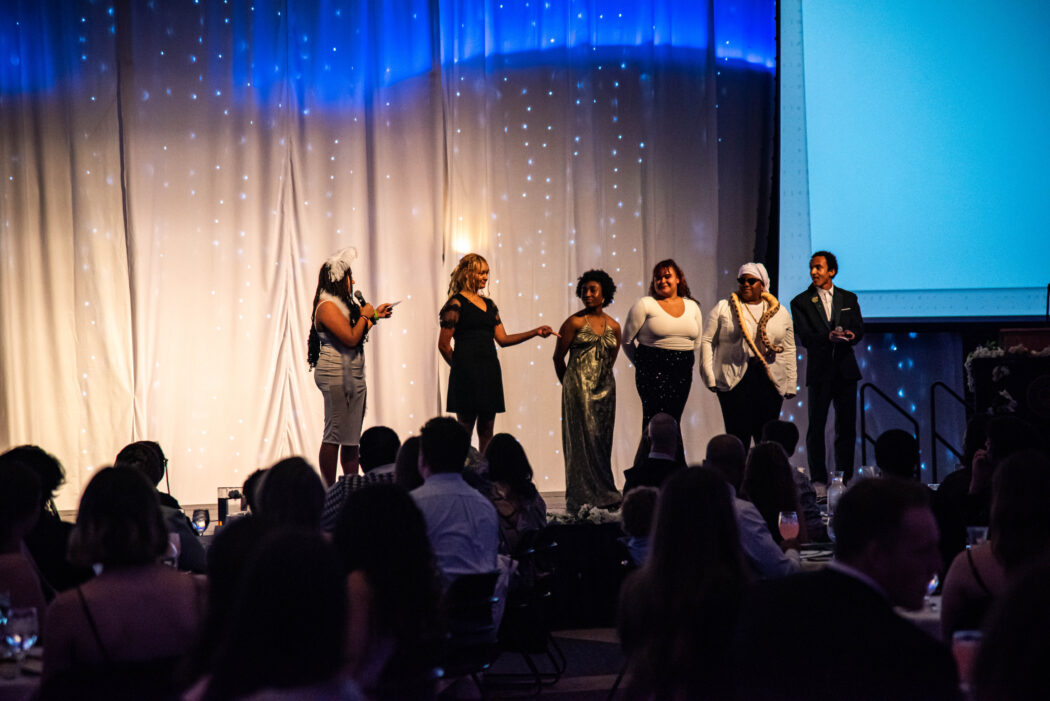USU community celebrates Black History month
The promise of a warm meal and live entertainment filled the halls of the TSC with people eager to enter the Black Student Union’s annual Soul Food Night on Feb. 2, kicking off this year’s Black History month.
The BSU hosts a variety of events — such as movie nights, art showcases and lecture series — to celebrate Black History month, with Soul Food being the biggest. This year’s event completely sold out all 300 seats.
Alexis Brown, a third-year student majoring in animal and dairy sciences, is the BSU treasurer.
“I love being a part of BSU,” Brown said. “We have so much going on throughout the year so Soul Food is definitely the hardest thing to do.”
Brown felt inspired to join after attending a BSU event.
“I had gone to one of BSU’s events about celebrating your curly hair,” Brown said. “I thought that this was actually really cool. And from there, I decided I wanted to be a part of that.”
The event has left a lasting impact on many of its attendees.
“My favorite experience has been finishing Soul Food,” Brown said. “It’s my favorite because we put so much work into Soul Food and it’s great to see it all come together.”
Jasmine Kemp, a third-year student majoring in international studies, is the president of BSU.
The primary purpose of BSU, according to their mission statement, is to gain a deeper understanding of all cultures and “promote a higher level of Black consciousness.”

Jontrell Roquemore speaks at the Soul Food event in the TSC Ballroom on Feb. 2.
“My favorite experiences have been doing these different events with BSU,” Kemp said. “We got to go to Salt Lake for conferences, and we also went to New Orleans for a conference. It’s a whole bunch of fun stuff.”
Isaiah Jones, the senior director for the Division of Diversity, Equity and Inclusion, took on his position in January 2023 and has been at USU since 2009, completing both his undergraduate and graduate degrees.
Jones said Soul Food is important in facilitating inclusive excellence.
“Soul Food is meant to enhance belonging for all of our students while focusing on the African American experience,” Jones said. “We’re hoping people walk away with more of an understanding of the contributions of African American culture to where we are now.”
The event sets the stage for the six other major events put on by BSU during Black History month. These events explore Black music, artistry and the long-standing ramifications of slavery in America.
BSU will be screening the social critique film “I Am Not Your Negro,” on Feb. 15, an adaption of James Baldwin’s unfinished manuscript “Remember this House.” According to pbs.org, the film seeks to connect “the past of the Civil Rights movement to the present of #BlackLivesMatter.”
On Feb. 22, professor of history Kyle Bulthuis will present on slavery’s legacy and on learning from the nation’s past.
Jones said the Celebration of Black Artistry event on Feb. 17 is a collaboration between the Nora Eccles Harrison Art Museum, flute professor Jeiran Hasan and pianist Amy Glenn to showcase Black composers and Black art.

Many sauces are available for participants in the Soul Food event in the TSC Ballroom on Feb. 2.
“I love the arts,” Jones said. “I would definitely point folks to the art event for Caine College of the Arts, the Celebration of Black Artistry.”
The Business, Race and Society Forum on Feb. 9 is hosted by Doug Fiefa, Shontinese Huey, Oscar Marquina and Trudy Reese.
“If people have space and time I recommend the Business, Race and Society Forum,” Jones said. “It’s a very unique perspective, and it’s central to American culture and business. It’s about understanding how global corporations and business leaders think about these issues.”
Since 2009, Jones has witnessed the hard work of students, faculty and staff to create a culture of inclusion.
“The work put into becoming more inclusive is not new,” Jones said. “What I’ve seen over the years is pulling it all together. It’s all happening at the same time in a very intentional way in order to have the broadest impact and bring more people into the conversation.”
Jones said celebrating Black History month as a community is important because Black history is a reflection of American history.
“Black History month reminds us that Black history is also the history of the United States,” Jones said. “We really can’t tell the story of the U.S., or even USU, without knowing Black history.”
African American influence is found in nearly every aspect of American culture, literature and art according to the article “The Influence of Africans on American Culture,” published by the American Academy of Political and Social Sciences. American music, especially, originates in Black artists and communities.
“A lot of people don’t know that without African American music, you don’t have American music,” Jones said. “You don’t have jazz, rock and roll, hip hop and R&B. It’s impossible to tell the story without the contributions of African Americans.”
Jones said he views Black History month as a time to consider the past and celebrate his heritage.
“It comes down to reflecting on my identity,” Jones said. “How it shapes, how you see everything. You start reflecting in intentional ways on the stories of African Americans — how that’s contributed to where we are now.”
Kemp said Black History month celebration is a way for USU to encourage diversity.
“We don’t get a lot of education about Black culture besides events like this,” Kemp said. “There’s just not a lot of diversity up here. It’s important to put on an event where we can promote that diversity.”
According to Jones, the facilitation of learning and inclusion is the core of BSU and the driving force behind these events.
“We want all campus and community members to come,” Jones said. “People will ask, ‘who’s the target audience?’ and it’s everyone.”
Kemp said attendance is what keeps Black History month celebration alive at USU.
“Going to these events is the best way to support,” Kemp said. “The more that people come to the events means they will keep holding them.”
Brown said community is a crucial aspect of Black History Month celebration, especially in a predominantly White state such as Utah. According to DataUSA, only 1.36% of Logan, Utah’s population is Black or African American.
“We’re part of the community,” Brown said. “Black people are here on campus even though we’re few and far between. We are part of your community and you are a part of ours.”

